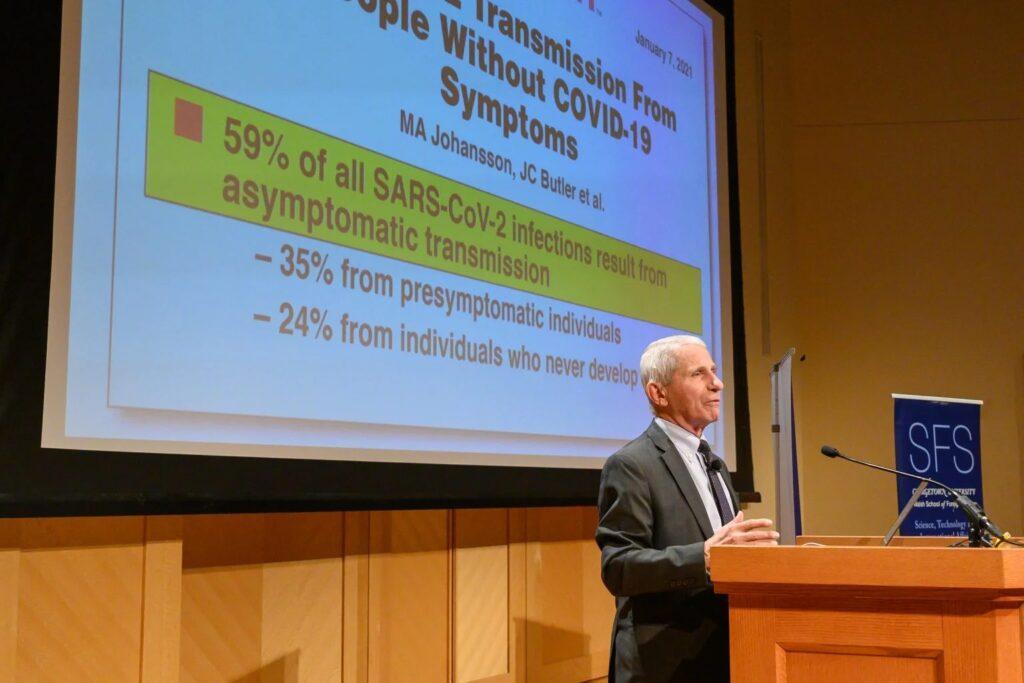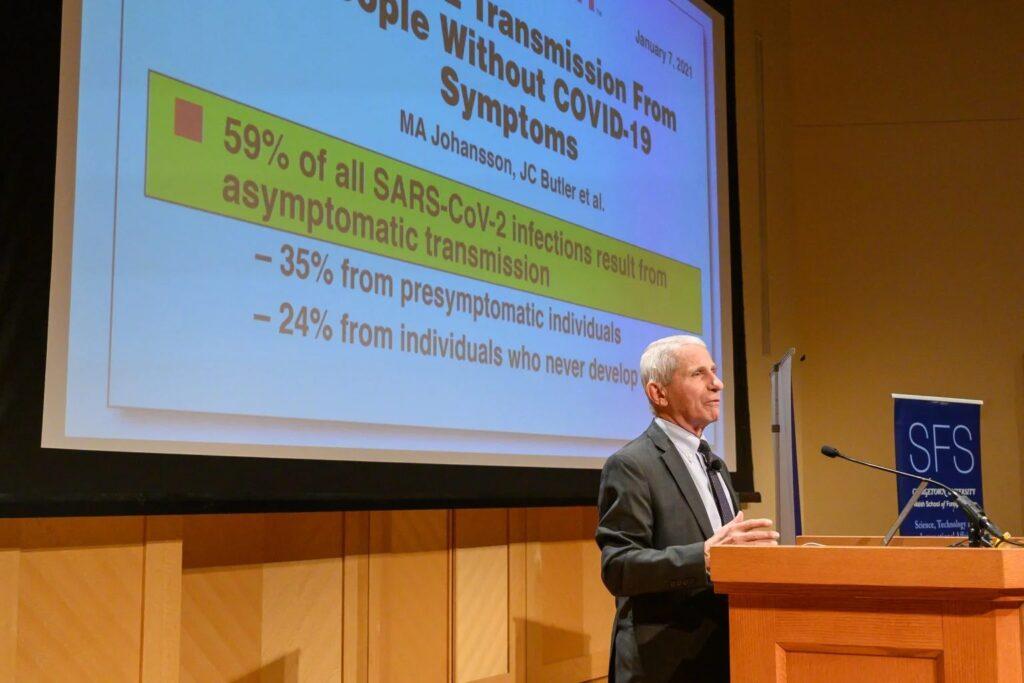Dr. Anthony Fauci (H ’90), former White House chief medical advisor and former director of the National Institute of Allergy and Infectious Diseases, came to Georgetown University March 27 and spoke on pandemic control and prevention.
Fauci’s talk, “Pandemic Preparedness and Response: Lessons from COVID-19,” was this year’s Maloy Distinguished Lecture on Global Health, an annual event that features notable public health leaders. Fauci reflected on the strengths and weaknesses of the U.S. response to COVID-19 and proposed public health practices that will better prepare the nation for future pandemics.

Following introductions from Joanna Lewis, director of the science, technology and international affairs (STIA) program, and Joel Hellman, dean of the Walsh School of Foreign Service, Fauci shared a brief history of the COVID-19 pandemic timeline and some of the lessons he learned while coordinating the United States’ public health response as a member of the White House’s COVID-19 task force.
Fauci said one of the biggest scientific challenges COVID-19 posed was the rapid emergence of new viral variants.
“We were completely unprepared, historically, to have continual waves of viruses of the same broad species that continued to evade immunity,” Fauci said at the event. “Obviously, we now have updated boosters, but we really can’t be playing whack-a-mole for every new variant because we will continue to have new variants.”
Pointing to a graph of COVID-19 cases in the early stages of the pandemic, Fauci emphasized the importance of employing countermeasures early and rapidly when a pandemic begins to emerge.
“When you’re dealing with a pandemic, what you are dealing with today was caused by something that happened two to three weeks ago,” Fauci said. “Pandemics are not linear; they’re exponential.”
According to Fauci, there was immense value in having health care infrastructure such as global data-sharing networks and clinical trial programs already established before the start of the pandemic. He noted that the clinical trial network utilized for the development of an HIV vaccine was rapidly adapted for COVID-19 vaccine research.
“All of the networks that we did clinical trials with HIV, we leveraged them and overnight converted them to what we call the COVID-19 Prevention Network, or COV-PN,” Fauci said. “If we didn’t have that infrastructure that we utilized — that we built 40 years ago — we never would have been able to do this as rapidly and as efficiently as we did.”
He also credits the rapid development of the COVID-19 vaccine to prior scientific advancements, emphasizing the importance of investing further in clinical biomedical research.
Looking forward to prevention of future outbreaks of other infections, which he says are inevitable, Fauci said using a Prototype Pathogen Approach, in which pathogens are grouped into distinct families and preventative research is conducted on each family to prepare for an outbreak of any pathogen within the family, will allow the public health community to deal with future pandemics proactively instead of reactively.
“You take classes and families of pathogens and you build on the prior experience with one of the pathogens within a big family,” Fauci said.
Fauci said it is important for scientists to pay attention to the animal-health interface, which he said is becoming increasingly important as zoonotic infectious diseases — those which can transmit from animals to humans like COVID-19 — start becoming more prevalent. Working to preserve tropical and subtropical forests, expanding animal husbandry biosecurity programs and strictly regulating wildlife markets will be critical to reducing the risk of future zoonotic pandemics, according to Fauci.
Fauci also addressed the role that existing racial and economic inequities played in exacerbating the effects of COVID-19, saying discrimination, limited healthcare access, risk-prone occupations and multigenerational housing increased the likelihood of infection with COVID-19.
“Pandemic emergences put a bright spotlight on the core existing health disparities that are related to the social determinants of health,” Fauci said.
Fauci closed the lecture by offering insight about how future health leaders can work to prevent pandemics before they begin.
“Our task, and our lesson that we need to learn, is that if we do pay attention to some of the things that I’ve spoken about, that you can prevent an emerging infection from becoming a pandemic,” Fauci said. “Emerging infections are a perpetual challenge, and the only way you address a perpetual challenge is by perpetual preparedness.”





















